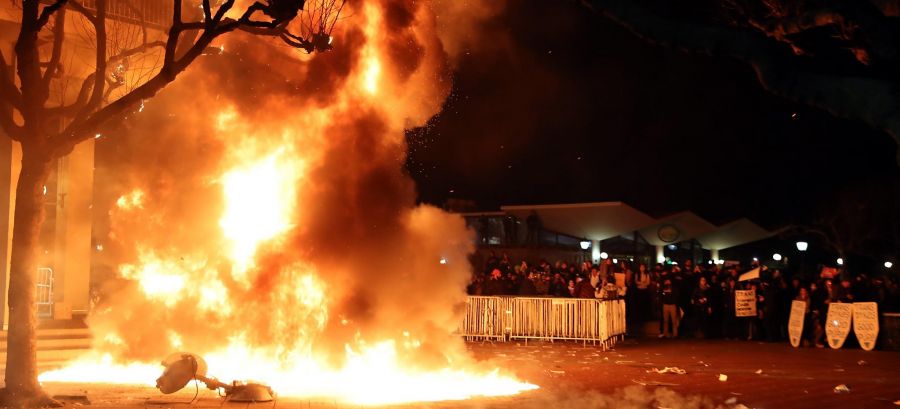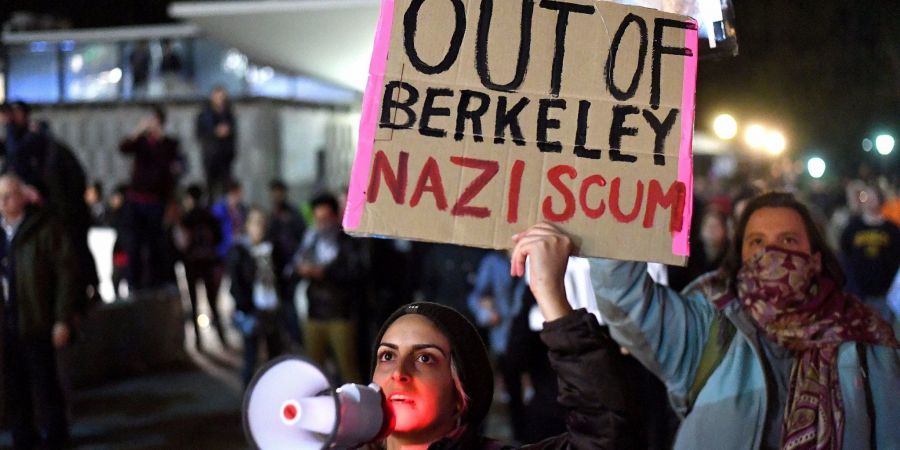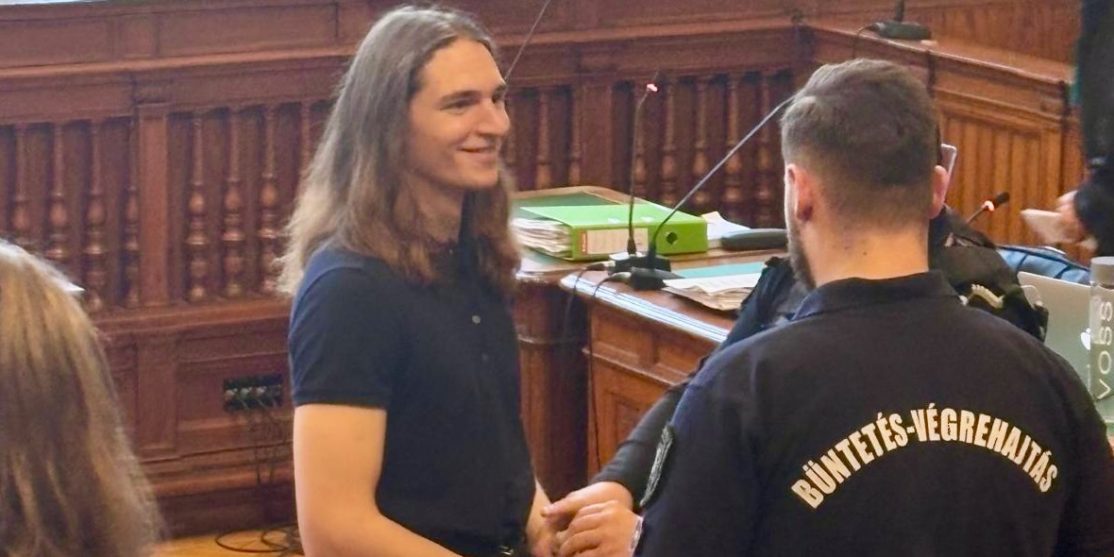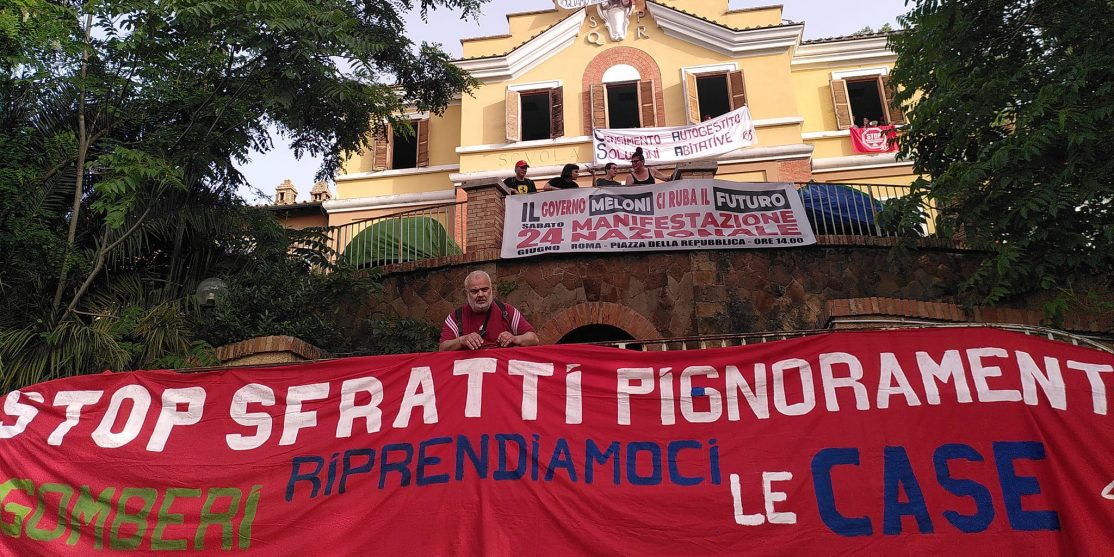From Berkeley to JFK: An Emergent Movement Against Trump and his Fascists

At the request of the College Republican Student Club, “alt-right” white supremacist Milo Yiannopoulos was slated to speak at the University of California, Berkeley on February 1. Numerous calls were made to the university administrators requesting cancellation. The administration did not heed these calls. Citing an empty dedication of freedom of speech, and perhaps scared to come into conflict with President Trump, Yiannopoulos was granted a public forum at the university. Luckily, more courageous souls prevailed, and Milo’s moment was stolen from him.
Instead of his talk, a spectacular pyre was built in UC Berkeley’s main plaza on wednesday evening. Earlier that day, campus police installed a gasoline-fueled floodlight in preparation for the demonstration. Hours later protesters spray painted the name “MILO” on its side, complete with a strike through all four letters. The floodlights and its generator were soon after pulled down and set aflame. As the fire roared, other actions were taken. Rocks were thrown. Police barricades broken. Glass destroyed. Fireworks shot at police. Fist fights with Trump supporters erupted. A roving dance party ensued. It is estimated that hundreds of people showed up hoping to shut down the talk. And in under 30 minutes this goal was achieved.
The actions taken at UC Berkeley are but the latest in a series of anti-Yiannopoulos protests. In fact, Yiannopoulos has run into opposition at practically every campus that he has visited. Just days before February 1, a student riot shut him out from speaking at another institution, the University of California, Davis. A talk held on January 20 sparked major demonstrations at the University of Washington. Skirmishes broke out, and a right-wing Yiannopoulos supporter shot an antifa in the gut. Even the California State University San Luis Obispo, a notoriously sleepy campus, erupted when Yiannopoulos visited. Students and workers worked side by side to try to shut down the talk. This is but a small glimpse into the background of the UC Berkeley actions.
Situating anti-Yiannopoulos struggles
Yiannopoulos and the protests against him did not arise from the dust. Instead, his emergence is best understood if situated within the larger political dynamic. This dynamic, while American in its specificity, is nonetheless reminiscent of the rise of right-wing populist ideas in other capitalist, liberal-democratic countries. Perhaps similar to Europe, American right-wing populism finds its basis in a situation of economic stagnation whose management has been driven by a class of technocratic, ostensibly cosmopolitan, liberal elites. It is against this backdrop that an entire kind of right-wing, anti-establishment edifice is enabled. Angst is directed at globalism and its governmental sponsors. Ire towards globalization quickly becomes anger directed at those who are thought to have benefited from “porous” national borders: immigrants.
But perhaps this is where the congruence with Europe ends. The current crop of American right-wing ideologists have begun creating their own strange forms of reactionary thought. Unlike white nationalists of Europe, those in the United States have had to grapple with the fact that they are not indigenous to American soil, and are of various European backgrounds. After all, on what basis can American white nationalist sensibilities persist if whites do not cohere into some “authentic” community? From this question springs the emergent group of “alt-right” white supremacist thinkers, of which Milo Yiannopoulos is a main part.
Alt-Right: Milo Yiannopoulos, et al.
Openly gay, Milo Yiannopoulos is a strange character by most standards. Old guard American white supremacist figures, such as David Duke, blast homosexuality and queerness as a direct attack on “proper” traditional values. In distinction, Yiannopoulos enters into the foray of white supremacy by emphasizing his gayness. But, how could this be? According to Yiannopoulos, the social expression of gayness is an outgrowth of a kind of freedom that has been progressively developed through Western culture. Of course, his is a view of gayness precludes other gendered configurations; it is a wholly misogynistic, reserved only for men.
It’s on the basis of gayness that Yiannopoulos cherry picks his attacks on rightwing, anti-gay strands of Islam. An easily disproven belief in a homogeneous European cultural structure, one that has a progressive arc of development, is the wellspring which enables Yiannopoulos to make this move. In comparison, Islam and other cultural or religious blocs are relegated to some lower “barbaric” order. It is on this basis that Yiannopoulos makes claims about the usefulness of supporting immigrants from other cultural backgrounds. It is rumored that Yiannopoulos had planned to release the full names of undocumented immigrant students who currently attend UC Berkeley. Thus, for Yiannopoulos, a presumption of a singular, European cultural supremacy animates his outwardly racist, white supremacist politics.
Other well known “alt-right” white supremacists follow a similar path. Richard Spencer, infamous by way of meme after getting punched by a masked antifa, is another example of this tendency. Spencer works alongside a group called Identity Europa. This group attempts to convince white Americans to “reconnect” to their European cultural roots. This “reconnection” is the foundation on which they base a politics of white supremacy. As a form of identitarianism, both Spencer and Yiannopoulos advocate a cohesive trans-European character, and atop of this, an extreme right-wing politics.
Riding on the coattails of now president Trump, there is a considerable amount of concern for the chance of a neo-fascist uptick. Making matters worse, there is speculation on the connection between these “alt-right” figures and Donald Trump’s chief strategist in the White House, Steve Bannon. Previous to his governmental position, Bannon was in charge of Breitbart, a “alt-right” news platform that currently has Yiannopoulos as an editor. It was for this reason, it seems, that the response to Yiannopoulos was so strong at UC Berkeley. Actions taken to prevent his talk from happening are part of a broad but growing movement against Trump and his right-wing acolytes.

A new movement is born, but what will become of it?
The movement against Yiannopoulos is the most recent occurrence in a nascent social movement. Spurred to act by Donald Trump’s miraculous win, there has been an ignition of political activity throughout the United States. This movement did not take long to foment–massive protests spontaneously erupted the day of the election, some lasting the course of four days. On January 21st, millions took part in what seems to be the largest national protest in American history, with over 4 million participating.
More recent was the response to Donald Trump’s executive order regarding immigration and travel. Trump’s unprecedented order halted all legal immigration from seven mostly muslim countries. Many US residents were detained at airports and were denied access to a lawyer. Others were send back, deported despite their legal residency papers. This prompted a massive wave of protests. Airports in every major US city saw an influx of people demanding the release of all detained immigrants. Some airports were effectively blockaded, such as the San Francisco International Airport, resulting in massive delays.
The anti-Yiannopoulos actions are the most recent battle in what is really a much larger intensification of social and political conflict. The riots staged against Yiannopoulos were forceful enough to get his next, and last, speaking engagement at the University of California, Los Angeles canceled. There is, however, nothing else on the horizon–what the future shall bring is opaque, unintelligible.
In truth, these words are deeply preliminary. The movement has yet to define itself. Thus far, all actions have remained reactive. Protests, riots, walk out, strikes–all of these mobilizations have occurred as strictly defensive. Americans are showing up, often in massive numbers, but in the name of rejection. Nevertheless, there is a widespread desire for a novel vision of tomorrow, and a politics that accompany it. There is a palpable desire for a new way forward that is premised in substantive equality and structural change.
But, so far, there is no compelling vision for what this form would embody. Nor a strategic vision of how to actualize it. In line with the politics of the past 30 years, the radical left is stuck between two unsatisfactory options. Reformist social democratic organizations on one side, or adventurist and fringe anarchist politics on the other. This is the key problem for the radical left in many places in the world. However, in its American iteration, this problem is severely felt. By dint of existing in the center of capitalist and imperialist power, the American radical left has been seriously sidelined and undermined for some time. It’s historical legacy is therefore faded. Its past successes and failures are missing from the consciousness of those who struggle today.
In a sense, the radical left’s weakly populated vision of the future plays into right-wing extremists hands. Riffing on historic racist and sexist tropes, right-wing ideologues such as Yiannopoulos are capable of offering a vision of the future, however dystopian. If the movement is to become something truly novel, it will have to develop a positive, strategic way forward. This is a difficult task. Though, by all means it is not an impossible one. Already, many have begun to organize in their local areas. Thousands of people have just recently existenced a kind of radicalized in various parts of the US. Emergent struggles seem to manifest overnight, exposing new social and political contradictions. In the chaos of today’s situation, there are truly no historical guarantees. But in this chaos, there is also opportunity.
* Justin Gilmore is a doctoral student in the History of Consciousness department at the University of California, Santa Cruz. He studies right-wing populism as a reaction against neoliberal politics and sociality. You can contact him at jtgilmor@ucsc.edu.




